Easing social issues while making beautiful clothes
The birth of a clothing label often takes a set path: A fashion lover becomes a fashion student, works under the instruction of varying employers and eventually tries to forge their own path, often as a result of creative frustration and a desire to take the helm.
It’s a typical tale.
When you meet somebody, as I did recently, who has arrived at the oft-sought after role of fashion designer, from a different path, it is perhaps not so surprising that their outlook of the industry is very different. They haven’t set up a brand to satisfy an aforementioned ‘creative frustration’, but rather identified a problem that a clothing brand might help solve. Providing employment and training opportunities for women, for example.
Today, the fashion industry is in a state of flux and as it unravels and begins to rebuild itself, it is perhaps the input of these revolutionaries that is the key to real change. Free from the mindset that comes with years of dutiful service, fresh eyes see different opportunities.
Women at the heart of fashion
People often say, that the last thing we need in this world is another fashion designer.
But in the case of Rebecca Fordham (though I’m fairly sure she’d rebuff the label), I’m inclined to disagree. We need her and her Tales of Thread.
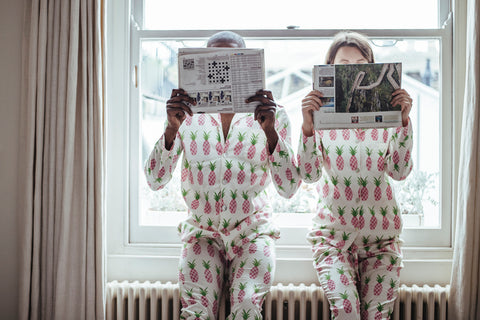
Pineapple Print, image courtesy of talesofthread.com
A member of the award-winning team behind docudrama Ten Days to War, she spent three years leading UNICEF’s global Child Protection Communications and launched the International Day of the Girl Child. These are just a few of a long list of achievements.
And here we are, sitting in a London café, talking about her latest range of pyjamas, including a rather beautiful pink pineapple print. A career curve ball you might think and yet, given a second thought, not really.
While the organisations she has worked for previously may remain A-political, everything she’s done up to this point has been driven by a social message. And what is fashion, if not a way of communicating that message internationally?
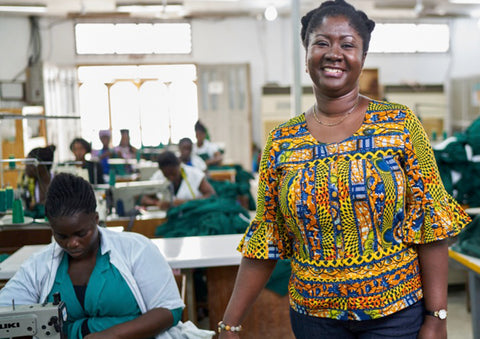
Image courtesy of talesofthread.com
Women are at the heart of this brand: from designer to factory owner to producer, with a handful of other collaborators in-between.
The Cadling factory in Accra, Ghana, where the pyjamas are made, is run by Linda Ampah and she exclusively employs women. And it is no typical factory, but rather one centred on collaboration, education and empowerment.
A piping machine sent in from Germany (for the detail on the hems and cuffs of Tales of Thread pyjamas) is a joint investment between both brand and factory. Such machinery allows a greater manufacturing finesse for both Rebecca’s pyjamas as well as other brands using the production facility. Linda’s employees learn the skills required for each different stage of the manufacturing process, leaving them with a broad range of transferable skills.
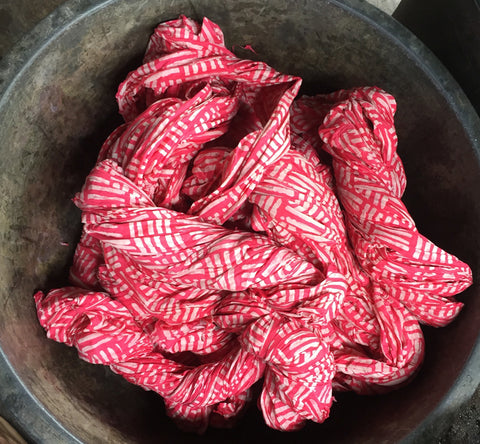
Kente Print, image courtesy of talesofthread.com
The factory where the fabrics are made is run by Edwina Assan,who currently employs six other women and has plans to increase that number to 100.
Every pair of pyjamas represents a collaboration between women. The supply chain itself was part engineered by another enterprising pair at Ethical Apparel Africa (EAA). Set up by Keren Long and Paloma Pineda, EAA is an organisation aiming to link brands and producers sharing the common values of achieving the triple bottom line of people, planet and profit.
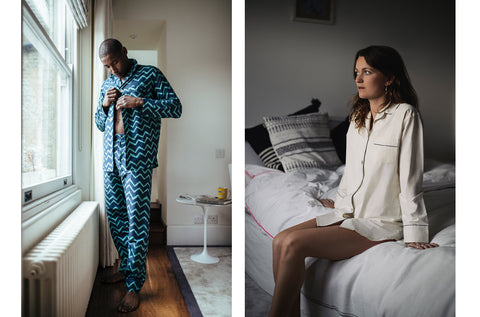
Wave Print (left) and Ivory (right), images courtesy of talesofthread.com
Well-made clothing comes are a cost, and understandably so
If you’ve taken the opportunity to click on one of the many product links in this article so far, you will know that at £105-£145 a pop, these pyjamas don’t come cheap.
At this point, I could mention the perfect cut of the leg (which tapers slightly towards the hem, expertly flattering all shapes and sizes and avoiding contact with the ground), the roomy pockets, the slightly higher waist, the beautiful piping details, the natural shell buttons, or the individual organic wash bag and its traditional, recycled Ghanaian beads in which the pyjamas are packaged.
But there is something else I would like to point out too.
When it comes to purchasing pyjamas, we often lower our budget. There is something about their inconspicuousness that diminishes the value we place on them. Compared to all our other clothes, hardly anyone will see us in them, making them, in our eyes, less worthy of our investment.
But what we chose to wear to bed are the items we are choosing to wear hundreds of times over – and very close to our skin.
If you think about what you wear most often, it probably isn’t that white shirt, or those skinny jeans. It’s your favourite pyjamas – so you might as well invest in a pair you can be proud of.
Bring on bed time.
Discover Tales of Thread at Okapi, 40 Eaton Terrace London, until the end of August.

This post was also published on The Huffington Post

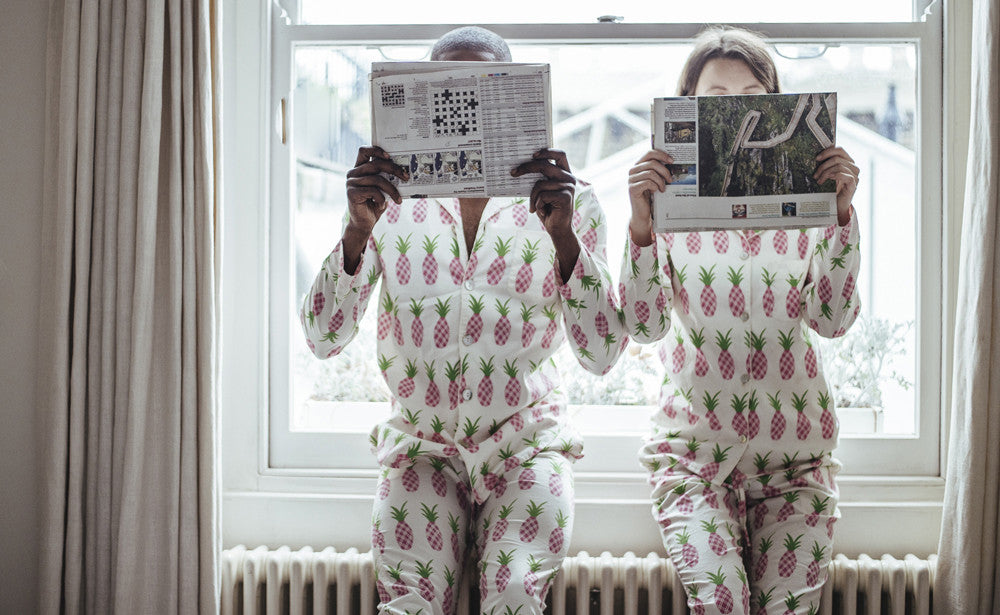
Thanks Ashley – pleased you like the brand and story! It’s a good’un! Ellie
Lovely post, Ellie. You are spot on, pajamas are an essential staple in every wardrobe & we should wear ones that genuinely make us feel good & comfortable. Thank you for sharing the story behind Tales of Thread.
Leave a comment